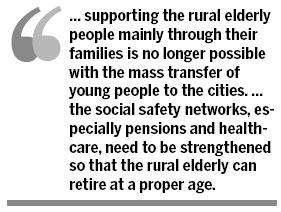
Population aging is occurring at a faster rate in rural regions than in urban areas, according to a report released by the World Bank last week.
In the report entitled "Elderly and Old Age Support: Challenges and Prospects", it predicted that China's rural old-age dependency ratio will reach 34.4 percent in 2030, which means every 100 rural residents will have to support 34.4 old people.
According to He Yupeng, a researcher in agricultural studies at the Development Research Center of the State Council, the main cause of this phenomenon is the migration of rural labor into cities. In some regions more than 90 percent of the rural labor force in their 20s are seeking jobs in cities.
As a result, the average age of the 150 million migrant workers who work in other cities or provinces is 29, while that of agricultural laborers is 42. In Jiaxing, Zhejiang province, a region with a high industrialization rate, the average age of rural workers has even reached 57, as most young rural people have left the farms to work in the city.
But He disagrees with those who suggest that an aging rural labor force constitutes a threat to China's food security because the introduction of modern technology into agriculture means rural aging does not necessarily curb agricultural productivity. Today the power of agricultural machines nationwide has reached 1 billion kilowatts, increasing by 100 million every two years, according to He.
To illustrate the decreasing need for agricultural labor, He pointed out that today it takes a laborer less than 10 days to grow either wheat or rice, while in the 1990s it would take a rural laborer 20 days to grow rice, or 14 days to grow wheat.
Therefore the mere outflow of labor force will not have much of a negative effect upon agriculture in China, He concluded. According to the estimates of his team, China's rural regions still can move about 80 to 120 million rural laborers in their 40s and 50s to cities, because they work for slightly more than 120 days a year, that means, one third of the year is free for them.
But the changing structure of the agricultural labor force might harm China's agricultural potential in the long run, He says. "One serious problem is that the older people in rural regions have not received enough education and cannot master the necessary skills of modern agriculture."
So the challenge is to reverse the trend so that young people are willing to do farming. But that requires raising the income of farmers.
He found that in 2009 on average a farmer could earn 54 yuan ($8.6) a day if he or she was employed to help other farmers with agricultural work, while migrant workers earned 46 yuan a day in cities. But the former earns much less for the whole year because he or she works fewer days.
Dang Guoying, a researcher with the Rural Development Institute of the Chinese Academy of Social Sciences, says that for the majority of farmers, if they have ten times the land they presently plant, they will gain more from agriculture than they would as migrant workers in cities. "Modern technology in large-scale farming can effectively raise farming incomes," he said.
Farming scales can be enlarged through specialization, added He. "There are already professional harvesting teams that harvest with machines, thus raising the productivity of all," he said. "Other parts can also have their own professional teams."
Another serious challenge aging may pose rural areas is the increasing burden of supporting the elderly. The World Bank report also found that the pension system only covers 4.6 percent of rural people, about one tenth the coverage in urban areas.
Wang Xiaoyi, another researcher from Rural Development Institute, said that supporting the rural elderly people mainly through their families is no longer possible with the mass transfer of young people to the cities. He said that, "the social safety networks, especially pensions and healthcare, need to be strengthened so that the rural elderly can retire at a proper age".Besides offering support, He said there is an immense need for rural nursing homes, which would also create job opportunities.
The author is a writer with China Daily.
zhangzhouxiang@chinadaily.com.cn
(China Daily 04/18/2012 page9)